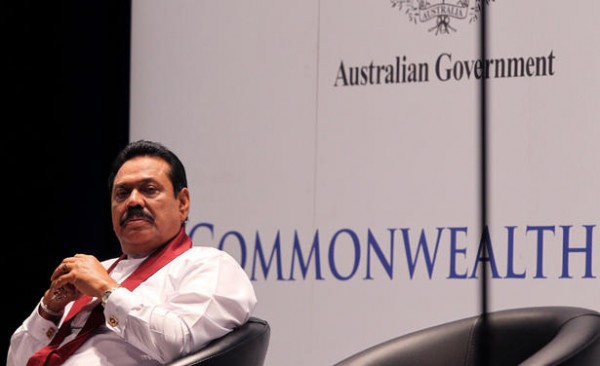Photo courtesy Transcurrents / by Tony Ashby, AFP
Bandula Jayasekara (@bundeljayse) is currently one of Sri Lanka’s highest-ranking diplomats, as Consul General in New South Wales and Queensland, Australia and former Consul General to Toronto, in Canada. His Twitter account has consistently featured bitter invective and all-manner of unsubstantiated allegations against civil society and human rights activists in Sri Lanka. Recently, a tirade of abusive tweets against British documentary maker Callum MacRae, calling his, inter alia, a paid LTTE mercenary, a chicken, anti-Sri Lankan and going on to unequivocally and unilaterally note “I will not allow him to come to Sri Lanka on any ground”.
At the time, the domestic and international media accreditation process to attend CHOGM 2013 hadn’t started, making Jayasekara’s threat to ban journalists from attending even more outrageous. As the Commonwealth Secretariat notes,
The Commonwealth Secretariat is working with the CHOGM 2013 Taskforce in Sri Lanka to address concerns raised in the media about accreditation.
As is customary, the Commonwealth Secretariat is the final authority for all international media accreditation for CHOGM. The accreditation process will be carried out in collaboration with the host country authorities, who are responsible for processing and approving visa applications by accredited media.
Media accreditation is open to all bona fide journalists, including online media practitioners, broadcasters, photographers, film and television camera crews and technicians. Every effort will be made to facilitate attendance and coverage of CHOGM by the media.
Emphasis theirs. There are however real and growing fears of open and covert censorship before, during and after CHOGM by the Sri Lankan government. On 10 July, the Committee to Protect Journalists (CPJ) penned an open letter to the Secretary General of the Commonwealth, Kamalesh Sharma. The letter reminded Sharma of an interview, late June, in which he said that the Commonwealth is active in Sri Lanka in advancing Commonwealth values, including human rights and the media. CPJ’s letter clearly outlined the reality in Sri Lanka,
But press reports from Colombo have indicated that the Sri Lankan government intends to enforce stringent background checks on any foreign journalists covering the meeting, with the apparent intention of denying them permission to enter the country. A document recently released by the Sri Lankan government said that the authorities reserve the right to “exclude any person… and impose additional conditions of entry to Sri Lanka… regardless of whether or not that person is accredited.”
Journalists will be issued accreditation by a task force, which is a division of the Sri Lankan Ministry of External Affairs. The ministry has stated that credentials may be “withdrawn, suspended, or deactivated for any reason at any time.”
Another open letter to Sharma, UNP MP Mangala Samaraweera, highlighted concerns over blanket censorship particularly after the CHOGM Summit.
In fact, the Defence Secretary, recently identified social media such as Facebook and Twitter as a serious threat to national security and plans are afoot, according to reliable sources to ban social media as well as to introduce the draconian code of ethics for the media, recently approved by Cabinet, after the summit in November.
It is in this context that the tweets of Consul General Bandula Jayasekara over the course of just a single day must be read. There is to our knowledge no governance around the use of social media by Sri Lanka’s foreign service, and Jayasekara’s Twitter account conveniently conflates personal opinion with official positions. On Thursday, 10th July alone, Jayasekara went after and included in his abominable invective journalists Callum Macrae, Frances Harrison, UK MP Alistair Burt, the Committee to Protect Journalists, the Editor of the Colombo Telegraph website and Senior TNA MP R. Sampanthan.
Jayasekara’s tweets and retweets over the course of Thursday alone featured the following language and sentiments,
- White tigress (referring to Frances Harrison)
- A bloody prick (referring to photographer and blogger Asanka Ratnayake, resident in Australia)
- Stray dogs (referring to Callum MacRae, though Jayasekara couched it as something he had read on the Derana website)
- Racist scum (a retweet, originally by @sittingnut and against Callum MacRae)
- Mercenary & “member of the rump” (referring to Callum MacRae)
- Chief Propagandist of LTTE rump (referring to Callum MacRae)
- MacRae and his blood money (allegation against the Colombo Telegraph website)
- “mud raking insulting attacking website” (referring to Colombo Telegraph)
- bunch of losers and cowards
- podiyan (referring to TNA MP R. Sampathan)
In response to a question as to whether he knows about the concept of libel, Jayasekara’s retort is quite revealing. Being critical of the President is, if Jayasekara is to be believed, almost a guarantee of being denied a visa to enter Sri Lanka.
@Callum_Macrae @pressfreedom @AlistairBurtFCO @commonwealthsec @nofirezonemovie I know what you said against my President in Toronto.
— Bandula Jayasekara (@bundeljayse) July 11, 2013
Jayasekara’s position on MacRae is also very clear,
@Callum_Macrae Let me tell u again. U can campaign against my country till cows come home. Your terrorist objectives will not be achieved.
— Bandula Jayasekara (@bundeljayse) July 11, 2013
All of Jayasekara’s tweets are in the public domain, and penned by him alone. Several senior voices from the British government, its High Commissioner in Colombo, several member states of the Commonwealth including, notably, Australia, and the Secretary-General of the Commonwealth himself have repeatedly claimed that hosting CHOGM 2013 can help further the values the Commonwealth is founded upon in post-war Sri Lanka. Going by the Consul General’s tweets, it is entirely unclear what this confidence is founded upon. Basic decency, diplomatic finesse and statesmanship are seemingly optional in Sri Lanka’s foreign service and within government.
Tellingly, Jayasekara’s tweets aren’t expressed or produced in a vacuum. They clearly reflect the thuggish mindset, expression and ideology of the Rajapaksa regime writ large. If this is the invective the government sees fit to project to the world in the lead up to CHOGM, imagine what they are doing to quell dissent within Sri Lanka.
